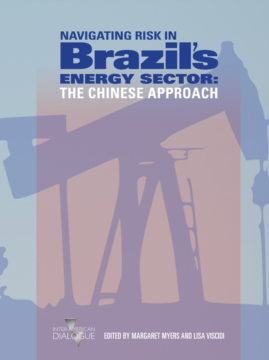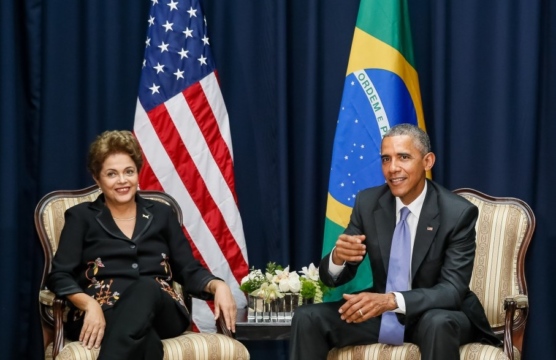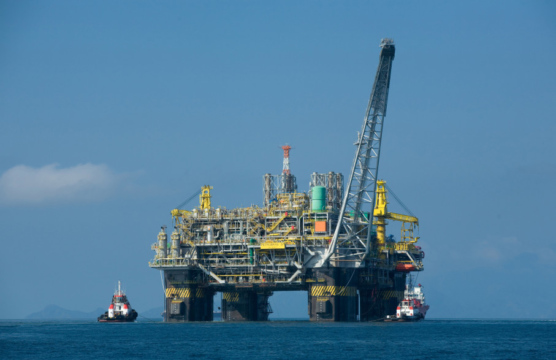
Navigating Risk in Brazil’s Energy Sector
Brazil’s oil and gas and electricity sectors are an important destination for Chinese direct investment.
Over the past weeks, public discontent with the administration of President Dilma Rousseff has continued to rise, as the country’s economy remains stalled and a multi-billion dollar corruption scandal unfolds at the state-controlled oil company, Petrobras. Mass demonstrations on March 15th brought hundreds of thousands of people to the streets, many calling for Rousseff’s resignation or impeachment. Her standing in the polls has dropped to unprecedented lows.
The Inter-American Dialogue convened a panel of leading experts to analyze the institutional, political and economic implications of these events.
After an introduction by the Dialogue’s president Michael Shifter, Otaviano Canuto -Senior Advisor on BRICS in the Development Economics Department at the World Bank- started the discussion by rejecting the notion that Brazil is facing an institutional crisis, as –in his opinion- “institutions are working, and those responsible for corruption are in jail”. Problems in Brazil, according to Canuto, are explained by a “crisis in the state capitalism model”, that Rousseff’s government has started to address. In particular, he pointed to the appointment of Joaquim Levy as Finance Minister after the President’s reelection, with a clear mandate to make the necessary macroeconomic corrections to get Brazil back on track. Finishing in an optimistic note, Canuto described the ongoing Petrobras scandal as an “opportunity for Brazil to open its economy, particularly in public procurement and other sectors related to the state, and promote private participation in these areas”.
In contrast, Claudia Trevisan -the Washington correspondent for São Paulo’s Estadão newspaper- highlighted the challenges Rousseff will have to face in order to rebuild her political leadership. She described Rousseff’s decision to distance herself from Levy’s reforms as “a mistake”, and also pointed out that –in a confirmation of the government’s weakening support- the Brazilian Chamber of Deputies chose a Speaker who is at odds with the President. According to Trevisan, Rousseff’s administration has “aged prematurely”, as it is facing intense political pressures in the context of a grave economic slowdown. This has forced the president – Trevisan concluded – to “address the problems she ignored during the electoral campaign, by implementing the same measures the opposition had announced”.
On a similar note, Peter Hakim –president emeritus of the Inter-American Dialogue- said that “Brazil is in great uncertainty, and its problems are largely political”. In his opinion, Rousseff has lacked the ability to deal with a fragmented Congress, unlike her predecessors Luis Inacio Lula da Silvia and Fernando H. Cardoso. This is a critical issue –Hakim continued- since political parties in Brazil “ask for state resources in exchange of support”. He concluded by saying that Dilma Rousseff knows what needs to be done to regain economic stability, but the problem relies on whether she can obtain the necessary support in Congress and in public opinion to implement it.
Finally, the panel discussed the importance of Rousseff’s announced visit to the United States, which will take place on June 30. Canuto described the visit as important, given that “both countries need to establish a positive agenda, to get bilateral relations back on track” after Rousseff cancelled a state visit to Washington because of an espionage scandal. Trevisan agreed, and added that it is in the interest of the United States to increase its trade with Brazil. She pointed out that the US could soon become Brazil’s first trading partner again, surpassing China. Hakim concluded by lamenting the lack of a concrete agenda for the encounter, highlighting that Brazil remains a closed economy in terms of trade.
Brazil’s oil and gas and electricity sectors are an important destination for Chinese direct investment.
Even though the Snowden affair paralyzed relations, exchanges between Brazilian and US officials have endured.
How bad is Petrobras’ situation today, and what bright spots are on the horizon?
 Video
Video
